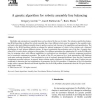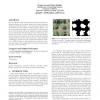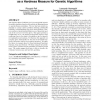844 search results - page 45 / 169 » Generalized crowding for genetic algorithms |
100
click to vote
GECCO
2007
Springer
15 years 8 months ago
2007
Springer
We present a genetic algorithm which is distributed in two novel ways: along genotype and temporal axes. Our algorithm first distributes, for every member of the population, a su...
120
click to vote
GECCO
2005
Springer
15 years 7 months ago
2005
Springer
The random number generator is one of the important components of evolutionary algorithms (EAs). Therefore, when we try to solve function optimization problems using EAs, we must ...
114
click to vote
EOR
2006
15 years 1 months ago
2006
Flexibility and automation in assembly lines can be achieved by the use of robots. The robotic assembly line balancing (RALB) problem is defined for robotic assembly line, where d...
GECCO
2005
Springer
15 years 7 months ago
2005
Springer
Recent adaptive image interpretation systems can reach optimal performance for a given domain via machine learning, without human intervention. The policies are learned over an ex...
79
Voted
GECCO
2007
Springer
15 years 5 months ago
2007
Springer
The Negative Slope Coefficient (nsc) is an empirical measure of problem hardness based on the analysis of offspring-fitness vs. parent-fitness scatterplots. The nsc has been teste...



